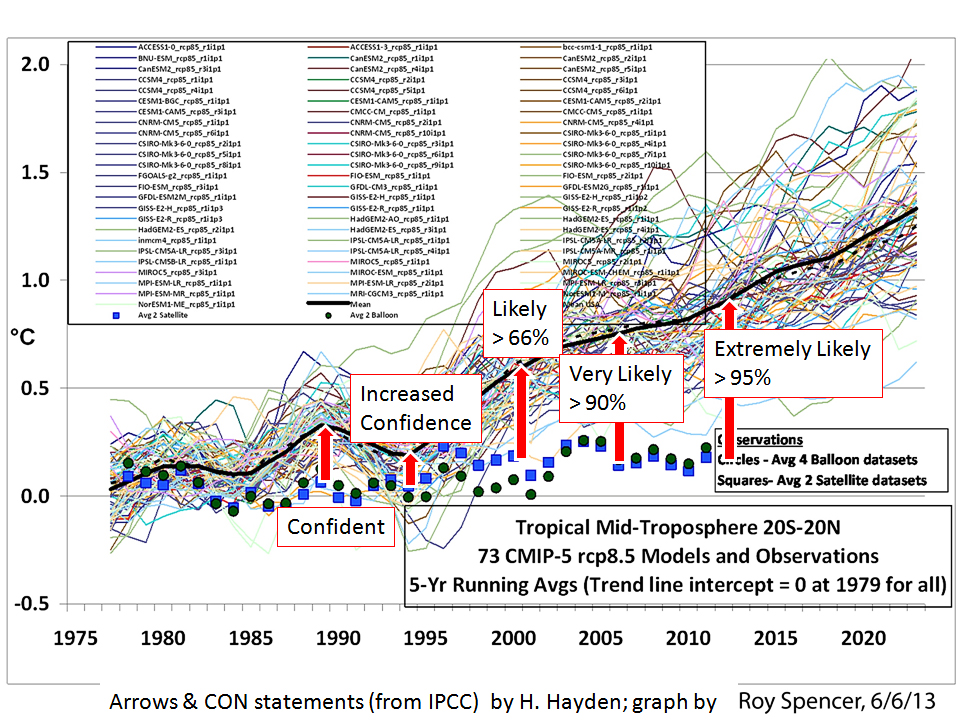
This claim is not even wrong for several reasons including:
1. As climate scientist Dr. Roger Pielke Sr. points out below, contrary to this op-ed and popular belief, climate models are not based on "basic physics" and/or "Newtonian mechanics," and are almost entirely comprised of "parameterizations," i.e. just a fancy word for fudge factors:

2. Many papers have shown climate models are 'short on the physics' required for realistic simulation of the Earth system, and due to inadequate resolution of 50 km to 100 km grid size [and even as low as 10,000 km grid size in some simulations], models cannot even come close to using "Newtonian mechanics" instead of "parameterizations"/fudge factors necessary to accurately model convection, clouds, and precipitation, which require much higher resolution of 1-2 km or higher.
4. No model can be properly initialized with the state of the entire climate system, since the observations are woefully insufficient to provide the initial state at a single point in time for the entire climate system.
5. Chaos theory explains why even if the huge impediments of #3 and #4 above could be overcome, it is still impossible to predict the chaotic and non-linear weather & climate system beyond 3 weeks in the future.
6. Recent papers explain why conventional climate models will continue to be unable to simulate the most essential aspects of climate such as convection, clouds, gravity waves, atmospheric circulation, ocean oscillations, etc. "for the foreseeable future" and "the fact that according to the last two assessment reports of the IPCC the uncertainty in climate predictions and projections has not decreased may be a sign that we might be reaching the limit of climate predictability, which is the result of the intrinsically nonlinear character of the climate system (as first suggested by Lorenz [father of chaos theory])."
7. The overheated climate models have been falsified at confidence levels of 95%-98% due to the mismatch between models and observations, including the inability to predict the 18+ year "pause" of global warming.
Thus, what logical reason is there to "have faith in the predictive capability of climate models" as Dr. Sellers demands at the New York Times? Use of the word "faith" by Dr. Sellers is very apropos since it is defined as "belief that does not rest on logical proof or material evidence." Newtonian mechanics, unlike climate models, is validated and rests on logical proof and material evidence, and thus, one can have "no faith in the predictive capability of climate models" without "discarding" "predictions based on Newtonian mechanics."

The 3 body problem obeys Newtonian mechanics but is not computable except in very specific instances because it is chaotic in behaviour, like the climate models, hence anyone who believed they couldn't make long term predictions about the 3 body problem would be correct and agree with Newton. Anyone who believed they could make long term predictions about the 3 body problem would be wrong and at odds with Newton. Piers J. Sellers seems to have got his logic the wrong way round.
ReplyDeleteGood point which shows he's "not even wrong"
DeleteEmbarrasing
Seven Years Ago, An IPCC Lead Author Exposed Critical Weaknesses of the IPCC Foretelling Tools
ReplyDeletehttp://wattsupwiththat.com/2014/11/13/seven-years-ago-an-ipcc-lead-author-exposed-critical-weaknesses-of-the-ipcc-foretelling-tools/
see this comment by Dr. Robert Brown of Duke:
ReplyDeletehttp://wattsupwiththat.com/2014/11/13/seven-years-ago-an-ipcc-lead-author-exposed-critical-weaknesses-of-the-ipcc-foretelling-tools/#comment-1787651
dT = 0.49(5.35log(C/Co)) = 2.62log(C/Co)
The reality is that the models have been wrong. There are climate related phenomena that they admittedly do not include. The idea that increased CO2 causes warming is hard coded into the simulations but that is not how the climate system operates. Then there is the question of the stability of the simulation process. Starting with a weather prediction simulation and increasing spatial and temporal spacing so it can predict climate may make the whole simulation process unstable. Hard coding in that more CO2 causes warming begs the question.
ReplyDelete